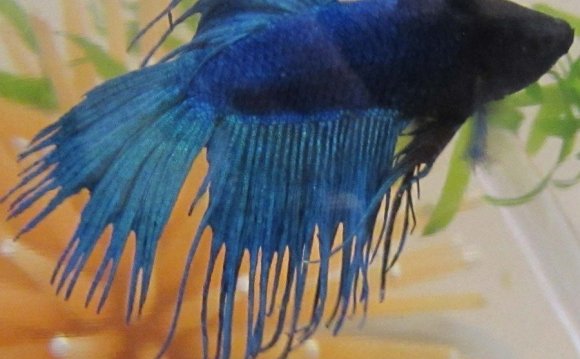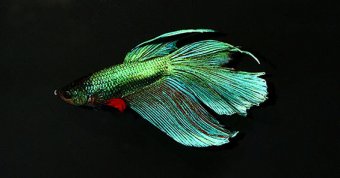
 Q. What is it about Betta fish that make people believe they are "easy" fish to take care of?
Q. What is it about Betta fish that make people believe they are "easy" fish to take care of?
Kevin Kohen: "Bettas are a member of the Osphronemidae family. Unlike most other bony fishes, these fish have a bony structure called a labyrinth organ. This complex bony structure, a modified extension found on the upper side of their first gill branch, enables these fish to gulp and breathe atmospheric air. For this reason, Bettas can be maintained for years in large bowls or containers that are not oxygenated - as long as the water is kept clean by performing water changes with de-chlorinated tap water of the same temperature."
Q. How long can Bettas live in those little cups I see at the pet store? Should they live in aquariums with a filtration system rather than a fish bowl or a lamp bowl? (To me, lamp bowls just seem like an unhealthy place for a fish.)
Kevin Kohen: "A filtered aquarium is always ideal for any aquarium fish. An aquarium with established filtration and proper size heater provides a stable environment. However, due to their unique physiology, Bettas can live in bowls without filtration as long as the following criteria are met:
- The water must be kept clean and free of ammonia and nitrite. This can be accomplished by not overfeeding and performing water changes when needed.
- The fish bowl should be kept out of direct sunlight and maintained in a room that has a stable temperature. Temperature fluctuations are very stressful to any fish. As long as the fish are fed properly and the previous criteria are met, they can do quite well in small unfiltered containers. While it is common practice for pet stores to keep Bettas in cups, I would provide these fish with more room to swim."
 Q. What should aquarists consider before purchasing a Betta fish?
Q. What should aquarists consider before purchasing a Betta fish?
Kevin Kohen: "The most important thing to consider before purchasing any fish is to make sure you can provide proper care. Research and plan ahead before purchasing any tropical fish, including Bettas. Fish require daily care and observation. If you can make this commitment and provide these animals with the proper care, Bettas make great pets."
Q. Where should people look for information if their Betta gets sick?
Kevin Kohen: "There are numerous publications written specifically about Bettas that include information pertaining to disease prevention and treatment. A local book store is one place to start. The Internet is another wonderful resource to learn about these fish, as well as our own website."
Q. Have you bred any Betta fish yourself? Are Bettas bred here in the US or abroad?
Kevin Kohen: "I have never bred Bettas but I have bred other Anabantoids such as Gouramis. These fish will build a "bubble nest" where eggs are deposited and fertilized. A bubble nest is a construct of numerous air bubbles held together at the surface of the water by secretions from the parent fish. The more common and colorful Betta (Betta splendens) is commercially bred in fish farms in Singapore, Thailand, and Malaysia. Some of the more unique species that may not exhibit incredible coloration are bred in the US by home breeders. These uncommon varieties are sold and traded through aquarium clubs, or sold to local pet stores."
Q. Why are male Bettas so aggressive?
Kevin Kohen: "Male Bettas are very territorial. Though males demonstrate aggressive territorial behavior towards other males, they are normally not aggressive towards other types of fish. It is in their nature for males to behave this way towards one another. Showing off their elaborate fins and defending desirable territory increases their chance of attracting a female to mate. The dominant male Betta will keep his rivals away so he will have the female fish all to himself."
Q. Is there any other information or facts you'd like to share about Bettas?
Kevin Kohen: "Bettas are hardy, colorful freshwater fish ideal for the beginner that has researched care and husbandry requirements. I cannot stress enough the importance of proper planning and research. Become a well-informed aquarist and provide the best possible care for these incredible fish."









